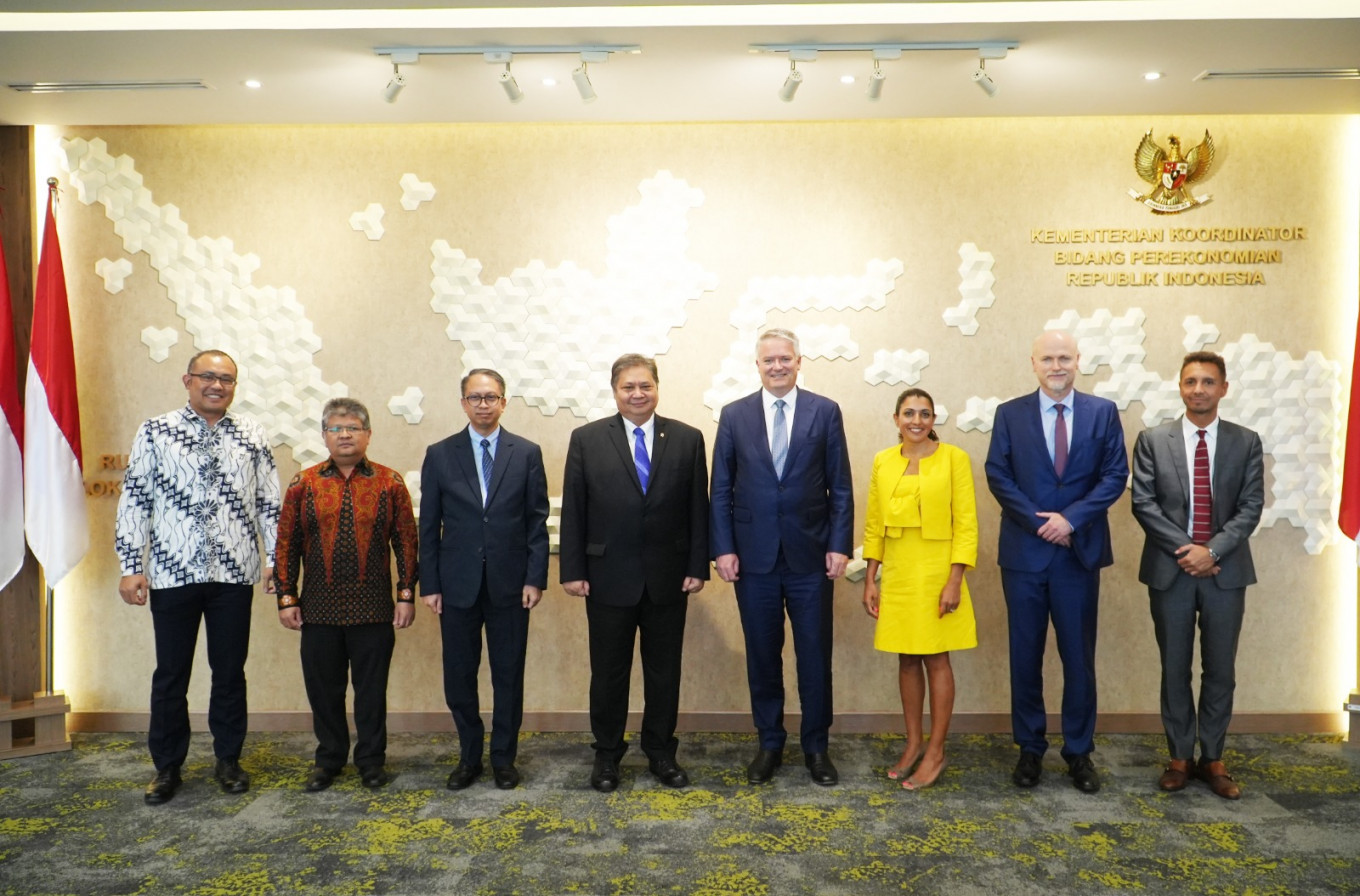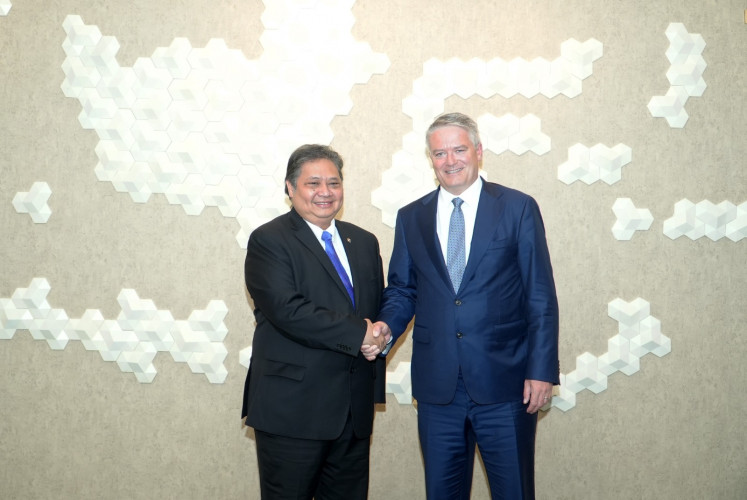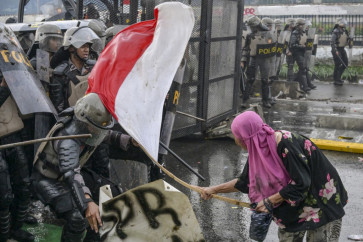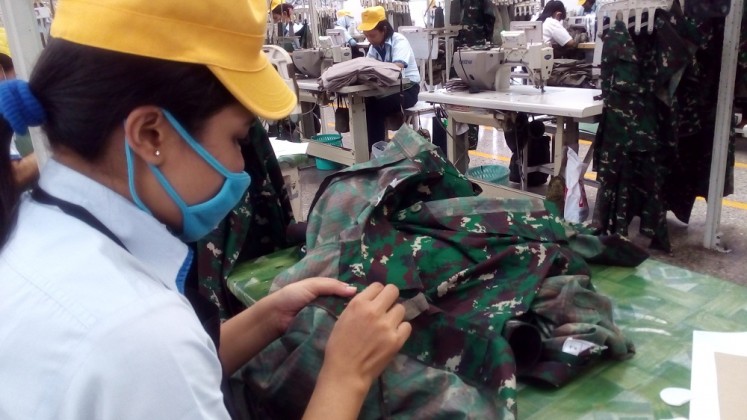Popular Reads
Top Results
Can't find what you're looking for?
View all search resultsPopular Reads
Top Results
Can't find what you're looking for?
View all search resultsIndonesia steps up standards with OECD Accession: Better Policies for Better Lives
Change text size
Gift Premium Articles
to Anyone
C
an Indonesia keep on raising living standards and avoid getting stuck? Secretary-General of the Organization for Economic Cooperation and Development (OECD) Matthias Cormann thinks so. This is why he was in Jakarta to discuss economic transformation.
Indonesia has expressed interest in joining the OECD — an intergovernmental think tank of 38 members — which shares the vision of "Better Policies for Better Lives". This is a like-minded group of economies with high gross national incomes, sustained long-term growth, and a demonstrated resilience to shocks. Members collaborate on building evidence and sharpening policy tools to ensure people benefit from sound economic management.
Over the last decade Indonesia has made solid progress, including reaching upper middle-income status, significantly alleviating poverty, and growing trade and investment. However, in a fast-changing world, policymakers need to be looking over the horizon to see what’s coming next and start preparing now for new challenges and opportunities.
The long-term national development vision is to advance to a high-income country by Indonesia's centenary, but this trajectory isn’t guaranteed. While it holds key advantages — natural resources, a demographic bonus, and the largest economy in the fastest-growing region in the world — Indonesia also needs to make careful and well-calibrated choices to avoid pitfalls, such as the middle-income trap, Dutch disease, deepening sub-national inequalities and mitigating geopolitical risks, such as strategic dependency.
This is a historic moment, where the country’s policymakers must lay a pathway toward sustainable broad-based income growth, intergenerational wealth creation and well-being for all. A new paradigm for economic cooperation could enable policymakers to make better decisions for diversifying the economy, finding new sources of growth, and ensuring resilience so no one is left behind. This is why Indonesia could benefit from building closer friendships with members of the OECD now.
Transformation begins with vibrant schools and a robust education system. OECD members like comparing their good policies and learning from their peers through a global benchmarking exercise, the flagship Program for International Student Assessment. Indonesia could reach or exceed international education standards by taking part in OECD dialogues and considering how to implement its policy recommendations. Indonesian kids should have access to the best teachers, curriculums and schools worldwide.
To empower people and communities to adapt to structural change, OECD members share data and analysis on education, labor and social policy. For example, Indonesia could promote its learnings from the pre-employment card, which has skilled up to 17.1 million people (about the population of New York) through their choice of training, reaching people in rural areas (64 percent of participants) and women (51 percent of participants).
OECD experts could support Indonesia’s preparations for the future of work, such as by aligning policy settings to shifting labor market needs, reforming vocational education and training, strengthening higher education and enabling lifelong learning. Good policy choices now would make sure Indonesians are work ready for future growth industries, including higher-paying science, technology, engineering and mathematics-related employment.
Joining the OECD could be vital for achieving national priorities for building a healthy innovation ecosystem and green industrialization. Facilitating the transmission of ideas and technology across borders is a top priority for OECD members because the evidence shows this leads to more competitive businesses and industries, wage growth and higher incomes for workers. The organization promotes world-class science, innovation and technology policy thinking so its members are first-choice destinations for international trade and investment. It offers data-rich insights for competition and industry policy, which could underpin Indonesia’s downstreaming priority, and its ASEAN vision for the region to be a global electric vehicle production hub.
Coordinating Minister of Economic Affairs Airlangga Hartarto is leading the step up in OECD activities to help strengthen Indonesia's grand strategy for catalyzing further economic transformation and regional connectivity. He wants to unleash technology-led investment to boost the international competitiveness of Indonesia's new growth industries, for example, in its emerging green and blue economies, which depend on securing technology collaboration and innovative financing solutions, as well as taking part actively in international standard setting.
His agenda is focused squarely on international economic collaboration “because friends need to work together to help each other out”. His ministry is enhancing multilateral trade and investment cooperation to ensure more economic opportunities reach the people of Indonesia. He hopes stepping up activities with the OECD could strengthen Indonesia’s design of a grand strategy for catalyzing a new level of economic transformation and regional connectivity. In fact, Indonesia’s policies on trade, industry, state owned enterprises and the focus on downstreaming could be better targeted through considering OECD recommendations. In the next steps, Indonesia should not merely rely on extractive industries, but also needs to improve its high-tech based critical manufactures.
Indonesia’s SMEs face barriers to internationalization. By embracing OECD standards and best practices on labor disciplines, environmental and social governance, and responsible business conduct, local businesses could access new markets. Openness to cooperation could enable higher value-added production, such as sustainable agriculture, fisheries, and forest management, and grow wages and revenue. Strengthening this part of the economy would support workers throughout Indonesia and lift its contribution to global value chains.
Continuing transformation depends on more high-quality investment in infrastructure — roads, bridges, seaports, airports, hospitals, railways, mobile towers and grids. Connectivity will improve livelihoods in Indonesia and the region and is achievable through evidence-based policy support for new growth centers, special economic zones, and high-productivity economic corridors, such as Semarang, Medan, Makassar and Nusantara. A closer relationship with OECD members could enable Indonesia to attract and diversify foreign direct investment and enhance access to deep capital markets and institutional investors, who are committed to high-quality and sustainable investment.
Strong institutions matter for the next phase of economic transformation, and a top priority for the people, modernizing Indonesia's public sector and corporate governance are an urgent priority. OECD members are proudly committed to accountability, integrity and transparency, the fundamentals for democracy and sound economic management. This is a work in progress for Indonesia. However, steps are being taken. By seeking to join the Financial Action Task Force, Indonesia is reforming anti-money laundering and countering terrorism financing regulations and policies. Officials are also negotiating international commitments toward a fairer economy. This means enhancing tax transparency and anti-corruption per OECD standards and best practices.
Indonesia is determined to achieve global goals for sustainable development and to address climate change, which is a further reason why it's seeking to join the OECD, the first economy in Southeast Asia to do so. A combination of the right policy choices and good friends could transform Indonesia into an advanced major economy, a sustainable engine of growth, underpinning global stability and prosperity.
This article was published in collaboration with Coordinating Ministry for Economic Affairs Republic of Indonesia











